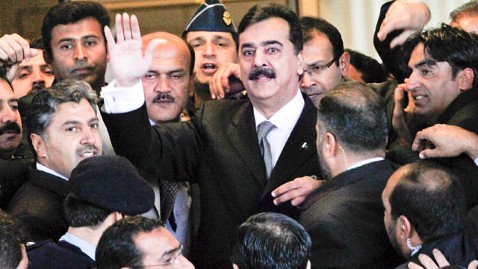
ISLAMABAD, Pakistan – Pakistan's longest serving prime minister was charged with contempt of court today, triggering proceedings that could paralyze an already weak government and lead to his removal from office.
Even if Yusuf Raza Gilani is convicted and thrown in jail, that is not expected to cause the government to fall, and important Senate elections will almost certainly proceed in early March. But the Pakistan People's Party continues to struggle to govern a country suffering from an economic crisis and ongoing violence, and the contempt proceedings are likely to further divert attention from critical subjects — including taking already delayed steps to repair the relationship with the United States.
Justice Nasir ul-Mulk, the head of a seven-judge panel of Pakistan's highest court, told Gilani today that he has "willfully flouted, disregarded, and disobeyed instructions given by this court."
"You have committed contempt of court … and you are to be tried," the judge said while reading the charge against Gilani.
In 2009, the court demanded that the government invite Switzerland to reopen corruption charges against President Asif Ali Zardari, who was accused of laundering money through Swiss banks. Gilani has refused, arguing that Zardari maintains immunity so long as he is president, and that the cases – which led to guilty findings in the 1990s – were politically motivated.
Today, Gilani appeared in court and pleaded not guilty. His trial will begin later this month and will likely dragged on for weeks, if not months.
"I am sanguine that the court will show restraint," said Punjab Governor Latif Khosa, a senior member of the ruling Pakistan People's Party and a former attorney general.
Even though today did not bring the downfall of the government, as some Pakistani media had suggested, it was still a historic challenge to the country's fragile democracy. Gilani is the first sitting prime minister to be indicted with contempt of court, and some fear that the court is trying to bring the government down, perhaps in collusion with the country's powerful military.
"This democratic dispensation — regardless of its own faults, regardless of its own omissions — it has had to face a lot of pressure, from Rawalpindi, from Apbarra," said Ayaz Amir, a columnist and an opposition member of parliament, referring to the headquarters of the military and its premier intelligence service. "It will be some time before we can say that look here, the tree of democracy has struck deep and strong roots, and it is there to stand."
That complicates Pakistan's relationship with the United States, whose popularity here has never been lower. Parliament had been expected to authorize new guidelines that require the U.S. to be more transparent in its actions inside Pakistan and pay more money to ship equipment into Afghanistan from Pakistan. But as the government has jumped from crisis to crisis, that authorization has been repeatedly delayed. Senior Pakistani officials – civilian and military — admit they cannot be seen as helping the U.S. fight what many Pakistanis still perceive as the "American war on terror."
The government seems determined not to write the letter to Swiss authorities.
"According to the law and constitution, the president enjoys immunity," Information Minister Firdous Ashiq Awan told reporters as she left the court. "Due to that, he cannot write the letter."
And because of that, Gilani has already acknowledged that he may be thrown out of office. In an interview with Al Jazeera conducted early last week, he said, "If I'm convicted, then I am not supposed to be a member of the Parliament."
This morning he arrived at court driving his own car, under strict security. Riot police kept the public far from the one mile drive from his home to the Supreme Court. A helicopter circled overhead, and inside the court, reporters were frisked and their IDs checked more than half a dozen times between the entrance and the court where the proceeding took place.
Inside, the seven judges arrived almost 15 minutes late, keeping the prime minister and dozens of his most senior supporters waiting. They sat on green leather chairs, illuminated by energy-saving bulbs and a skylight more than 50 feet above the floor. Gilani sat in the middle of the front row of the gallery, flanked by two coalition partners and, beyond them, cabinet ministers.
When asked by ul-Mulk, Gilani said he understood the charges and that he would respond to them in writing. Much of the hearing was taken up by ul-Mulk and Gilani's attorney, Atizaz Ashan, bickering over when to proceed with the case. Ashan convinced ul-Mulk to delay hearings despite requests to begin them later this week. Ashan will argue Gilani's case in court on Feb. 28.
After the hearing, the PPP and its coalition attempted to send signals of stability, as their political opponents held news conferences full of criticism of a government widely viewed as corrupt.
"We are standing here with sad heart. It's a very sad day in the history of the country," said Pakistan People's Party Secretary of Information Qamar Zaman Kaira. But he said Gilani had the right to defend himself and was still very much in charge. "He is the prime minister and he will continue to be the prime minister."
Gilani's coalition partners quickly met to deliver the same message. "The coalition partners expressed complete solidarity with the government," the group said in a statement.
沒有留言:
張貼留言